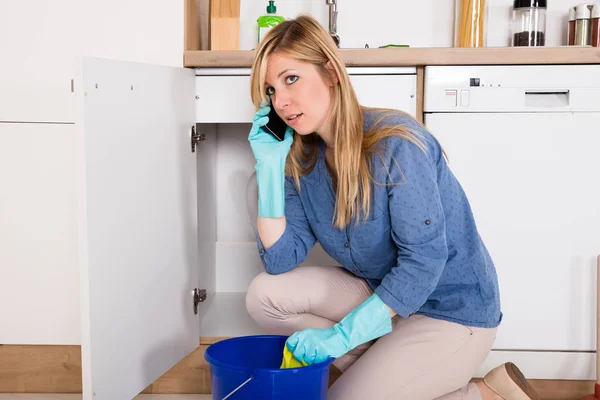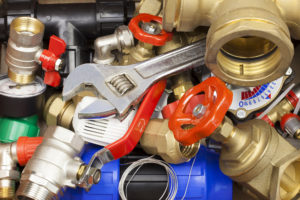The article author is making a few good pointers on Plumbing Emergencies: Tips on What To Do Before overall in this article in the next paragraphs.

Plumbing emergencies can strike at any time, causing stress and possible damages to your home. Whether it's a burst pipe, a stopped up drainpipe, or a leaky faucet, understanding how to manage the circumstance till a specialist plumbing professional gets here can conserve you from further problems. This post supplies crucial emergency pipes pointers to aid you mitigate damage and gain back control throughout a pipes crisis.
Shut off the Water System
The very first step in any kind of pipes emergency is to shut off the water system. For local concerns, such as a dripping tap or toilet, turn off the valve near the fixture. When it comes to a significant leakage or burst pipe, locate your home's primary water shut-off valve and transform it off quickly. Recognizing the place of these shutoffs beforehand can save useful time throughout an emergency.
Address Little Leakages with Short-lived Fixes
Small leakages can quickly end up being substantial troubles if left unchecked. Utilize these momentary solutions until professional assistance shows up:
While these fixes aren't permanent, they can assist reduce water loss and damage.
Unclog Drains Pipes Securely
A stopped up drainpipe can be an irritating and untidy problem. Right here's exactly how to tackle it:
If these methods don't function, stay clear of utilizing excessive force, as it might aggravate the obstruction.
Manage Overflowing Toilets
An overruning commode can trigger instant mayhem. Below's what you must do:
Shut down Your Water Heater
In certain emergency situations, such as a burst pipeline, it's smart to shut down your hot water heater. This prevents getting too hot or damage to the device when water stops flowing. Switch off the power supply to the water heater (electrical or gas) and let it cool off to avoid prospective hazards.
Momentarily Stop a Ruptured Pipe
A ruptured pipe can bring about significant water damages in minutes. To minimize the problem:
Call a specialist plumbing promptly to resolve the problem permanently.
Manage Frozen Pipes Very Carefully
In chillier climates, frozen pipelines are a typical emergency situation. If you suspect an icy pipe:
Avoid More Damages
Taking quick action to reduce damages can conserve you money and time in the long run. Right here's exactly how:
. Have an Emergency Plumbing Set
Prepare a fundamental pipes emergency situation package to take care of small problems successfully. Your package needs to consist of:
Having these devices accessible can make a substantial distinction in your capacity to take care of emergency situations.
Know When to Call an Expert.
While quick fixes can assist temporarily, certain pipes concerns call for prompt expert interest. Call a plumbing technician if:.
Quickly getting in touch with a professional makes certain the concern is solved properly and avoids further difficulties.
Final thought.
Plumbing emergencies can be frustrating, however with the best expertise and tools, you can manage the scenario successfully up until help gets here. By turning off the water supply, attending to tiny leakages, and using short-lived repairs, you can reduce damages and keep your home safe. Remember, these pointers are temporary options; always get in touch with a certified plumber to manage the root cause of the trouble. Preparation and fast thinking are your ideal allies in any type of pipes emergency.
Expert Tips for Emergency Plumbing Repairs
Plumbing emergencies can be incredibly stressful and inconvenient. Whether it’s a burst pipe, a clogged drain, or a leaky faucet, these common plumbing emergencies need immediate attention to prevent further damage to your home. But before you panic, it’s important to understand the basics of plumbing repairs and the steps you can take to address these emergencies. In this article, we will share some expert tips to help you navigate through these situations and minimize potential water damage.
Identifying Common Plumbing Emergencies
Leaky pipes and faucets Clogged drains and toilets Burst pipes Low water pressure Water heater problems Essential Tools for Plumbing Repairs
Plunger: Useful for unclogging toilets and drains Adjustable wrench: Needed for tightening or loosening nuts and bolts Pipe wrench: Ideal for gripping and turning pipes Tape measure: Necessary for accurate pipe measurements Plumber’s tape: Helps create watertight seals Understanding Emergency Plumbing Services
Emergency plumbing services are designed to provide immediate assistance for unexpected plumbing issues that can cause significant damage to your home, business, or health. These services are typically available 24/7 and are staffed by experienced plumbers who can quickly diagnose and repair a wide range of plumbing problems.
When a plumbing emergency strikes, time is of the essence. Whether it’s a burst pipe flooding your basement or a gas leak posing a serious risk, emergency plumbing services ensure that help is just a phone call away. These professionals are equipped with the tools and expertise to handle any situation, minimizing damage and restoring your plumbing system to proper working order.
What Constitutes a Plumbing Emergency?
Burst pipes or water supply lines: These can cause extensive water damage and need immediate repair to prevent flooding. Gas leaks or suspected gas leaks: Gas leaks are extremely dangerous and require prompt attention to avoid potential explosions or health hazards. Sewer backups or overflows: These can lead to unsanitary conditions and significant property damage. Clogged drains or toilets causing water to overflow: Overflowing water can damage floors, walls, and other structures. Leaks or water damage causing structural damage: Persistent leaks can weaken the structural integrity of your home or business. No hot water or heating: A lack of hot water can be more than an inconvenience, especially in colder months. Common Causes of Plumbing Emergencies
Aging or corroded pipes: Over time, pipes can deteriorate, leading to leaks or bursts. Improperly installed or maintained plumbing fixtures: Faulty installations or lack of maintenance can result in unexpected failures. Tree roots or other debris infiltrating your sewer line: Roots can grow into pipes, causing blockages and backups. Frozen pipes or water supply lines: In colder climates, pipes can freeze and burst, leading to significant water damage. High water pressure or sudden changes in water pressure: Excessive pressure can strain pipes and fixtures, causing them to fail. Natural disasters such as floods or earthquakes: These events can disrupt your plumbing system and cause severe damage. Steps to Minimize Water Damage
Locate the water shut-off valve: Knowing where the valve is can help you quickly cut off the water supply to the affected area. Turn off the water heater: If there’s a risk of water coming into contact with the heating element, make sure to turn off the water heater to avoid potential accidents. Open faucets and drain pipes: By opening faucets and drain pipes, you can relieve pressure and empty any standing water. Collect and contain water: Use towels, buckets, or bins to collect water and prevent it from spreading to other areas of your home. https://leecountyplumbingandwellservice.com/expert-tips-for-emergency-plumbing-repairs/

Hopefully you enjoyed our excerpt on What to Do While Waiting for an Emergency Plumber. Thanks a lot for taking a few minutes to read through our blog post. Sharing is good. One never knows, you may just be doing someone a favor. I recognize the value of your readership.
Website